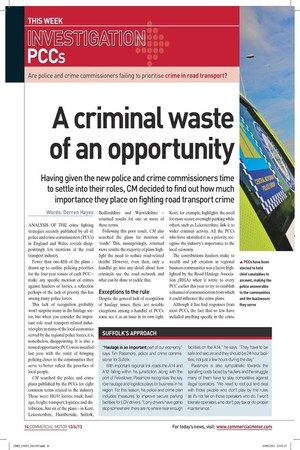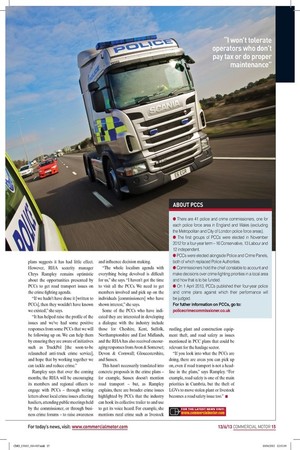A criminal waste of an opportunity Having given the new
Page 9

Page 10

If you've noticed an error in this article please click here to report it so we can fix it.
police and crime commissioners time to settle into their roles, CM decided to find out how much importance they place on fighting road transport crime Wora ucl ell Hayes ANALYSIS OF THE crime fighting strategies recently published by all 41 police and crime commissioners (PCCs) in England and Wales reveals disappointingly few mentions of the road transport industry.
Fewer than one-fifth of the plans — drawn up to outline policing priorities for the four-year tenure of each PCC — make any specific mention of crimes against hauliers or lorries, a reflection perhaps of the lack of priority this has among many police forces.
This lack of recognition probably won't surprise many in the haulage sector, but when you consider the important role road transport-related industries play in many of the local economies served by the regional police forces, it is, nonetheless, disappointing. It is also a missed opportunity: PCCs were installed last year with the remit of bringing policing closer to the communities they serve to better reflect the priorities of local people.
CM searched the police and crime plans published by the PCCs for eight common terms related to the industry. These were: HGV; lorries; truck; haulage; freight; transport; logistics; and distribution. Just six of the plans — in Kent, Leicestershire, Humberside, Suffolk, PCC earlier this year to try to establish plans suggests it has had little effect. However, RHA security manager Chrys Rampley remains optimistic about the opportunities presented by PCCs to get road transport issues on the crime fighting agenda.
"If we hadn't have done it [written to PCCs], then they wouldn't have known we existed," she says.
"It has helped raise the profile of the issues and we've had some positive responses from some PCCs that we will be following up on. We can help them by ensuring they are aware of initiatives such as TruckPol [the soon-to-be relaunched anti-truck crime service], and hope that by working together we can tackle and reduce crime."
Rampley says that over the coming months, the RHA will be encouraging its members and regional officers to engage with PCCs — through writing letters about local crime issues affecting hauliers, attending public meetings held by the commissioner, or through business crime forums — to raise awareness and influence decision making.
"The whole localism agenda with everything being devolved is difficult for us," she says. "I haven't got the time to visit all the PCCs. We need to get members involved and pick up on the individuals [commissioners] who have shown interest," she says.
Some of the PCCs who have indicated they are interested in developing a dialogue with the industry include those for Cheshire, Kent, Suffolk, Northamptonshire and East Midlands, and the RHA has also received encouraging responses from Avon & Somerset; Devon & Cornwall; Gloucestershire, and Sussex.
This hasn't necessarily translated into concrete proposals in the crime plans — for example, Sussex doesn't mention road transport — but, as Rampley explains, there are broader crime issues highlighted by PCCs that the industry can hook its collective trailer to and use to get its voice heard. For example, she mentions rural crime such as livestock rustling, plant and construction equipment theft, and road safety as issues mentioned in PCC plans that could be relevant for the haulage sector.
"If you look into what the PCCs are doing, there are areas you can pick up on, even if road transport is not a headline in the plans," says Rampley. "For example, road safety is one of the main priorities in Cumbria, but the theft of LGVs to move stolen plant or livestock becomes a road safety issue too." • "Haulage is an important part of our economy," says Tim Passmore, police and crime commissioner for Suffolk.
With important regional link roads the A14 and Al2 falling within his jurisdiction along with the port of Felixstowe, Passmore recognises the key role haulage and logistics plays for business in his region. For this reason, his police and crime plan includes measures to improve secure parking facilities for LGV drivers. "Lorry drivers have got to stop somewhere: there are no where near enough facilities on the A14," he says. "They have to be safe and secure and they should be 24-hour facilities, not just a few hours during the day."
Passmore is also sympathetic towards the spiralling costs faced by hauliers and the struggle many of them have to stay competitive against illegal operators. "We need to root out and deal with those people who don't play by the rules as it's not fair on those operators who do. I won't tolerate operators who don't pay tax or do proper maintenance." • There are 41 police and crime commissioners, one for each police force area in England and Wales (excluding the Metropolitan and City of London police force areas).
• The first groups of PCCs were elected in November 2012 for a four-year term — 16 Conservative, 13 Labour and 12 independent.
• PCCs were elected alongside Police and Crime Panels, both of which replaced Police Authorities.
• Commissioners hold the chief constable to account and make decisions over crime-fighting priorities in a local area and how that is to be funded.
• On 1 April 2013, PCCs published their four-year police and crime plans against which their performance will be judged.
For futher information on PCCs, go to: policecrimecommissioner.co.uk







































